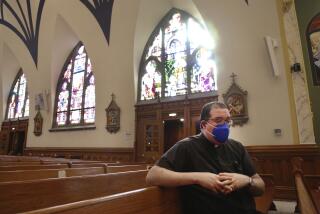Most Americans Identify With Christian Faiths : Survey: Results show that beliefs cut across ethnic and regional lines, expert says. Study was meant to fill gap left by the census, which does not ask religious preferences.
- Share via
NEW YORK — A broad new survey, described as the most extensive ever made of religious identification in the United States, finds that society overwhelmingly retains its Judeo-Christian character.
The survey found that 86.5% of Americans identified with Christian denominations and 2% with Judaism. Only fractional percentages identified with any other faith and 7.5% with no religion.
Only half a percent of Americans were counted Muslims, about 1.4 million, 40% of them blacks. Media estimates lately have put Muslims at more than 4 million. Some Muslim groups claim that the total is up to 8 million. More than half of the 1.5 million Arab-Americans were found to be Christians.
Despite recent widespread assumptions that Asian immigration has shredded the country’s common religious fabric, the survey findings show that it hasn’t happened to any substantial degree.
“What’s interesting is that our religion cuts across class, ethnic and regional differences,” said sociologist Barry A. Kosmin, the study’s director of The City University of New York’s graduate school.
“You look at race or ethnic origins and we’ve become very diverse, but you look at religion, there is much more commonality,” he said. “It’s a cohesive element. There’s latitude but within boundaries.”
The survey, involving a representative sample of 113,000 adults interviewed over a 13-month period, sought to fill an informational gap left by the U.S. Census, which never asks about religion.
The omission has meant that religious characteristics and trends in the nation have depended on piecemeal statistics, speculation and some wildly divergent estimates.
“There’s been a lot of misconceptions and disinformation,” Kosmin said.
The Americans questioned by the ICR Survey Research Group of Media, Pa., was more than 100 times larger than the usual survey and had a sampling error of only a fraction of a percent.
Although the survey turned up a big variety of religious groups and denominations, Kosmin said they stem pervasively from a biblical core of Judaism and Christianity, including their immense, open diversity.
“That’s what’s uniquely American,” he said. “It’s why this country doesn’t look like Yugoslavia,” he added, referring to its factional strife.
Instead of cultural splintering in this country, “what strikes me is that religion is in the mainstream Judeo-Christian culture,” ranged loosely in many different groups in an open “free market,” he said.
“There’s a diversity of structures and institutions, but a kind of overlapping Western religious tradition,” he said. “We see that there is more of a national culture than most people realize.”
A revealing feature of the findings was that most Asian-Americans are not Muslims, Buddhists or Hindus, but Christians. “Most immigrants (now as in the past) are in the mainstream of American religion,” Kosmin said.
Kosmin said his estimates should not be expected to match figures given by denominations, which use varying standards for counting.
“This is not religious affiliation. These are people’s perceptions of what they are,” Kosmin said. “If I want to call myself a duck, I’m a duck even though I can’t swim and haven’t got feathers.”
Among the larger Christian groups, 26.2% identify themselves as Roman Catholics (46 million) and 60.3% as Protestants (105.8 million).
The largest Protestant groups listed were 34 million Baptists, 14.1 million Methodists, 9.1 million Lutherans, 5 million Presbyterians, 3.1 million Pentecostals and 3 million Episcopalians.
Other findings:
The fast-growing Latino population makes up 14% of American Catholics, although a third of Latinos are Protestants.
Rates of marriage breakups were found to be surprisingly uniform across all groups, with the divorce rate lowest among Greek Orthodox and highest among Unitarians.
Roman Catholics, whose faith rejects divorce, have divorce rates similar to Lutherans and other Protestant denominations.
The most highly educated religious groups, in terms of the proportion of college graduates, are Jews, Hindus, Episcopalians, Presbyterians and Buddhists.
More to Read
Sign up for Essential California
The most important California stories and recommendations in your inbox every morning.
You may occasionally receive promotional content from the Los Angeles Times.













